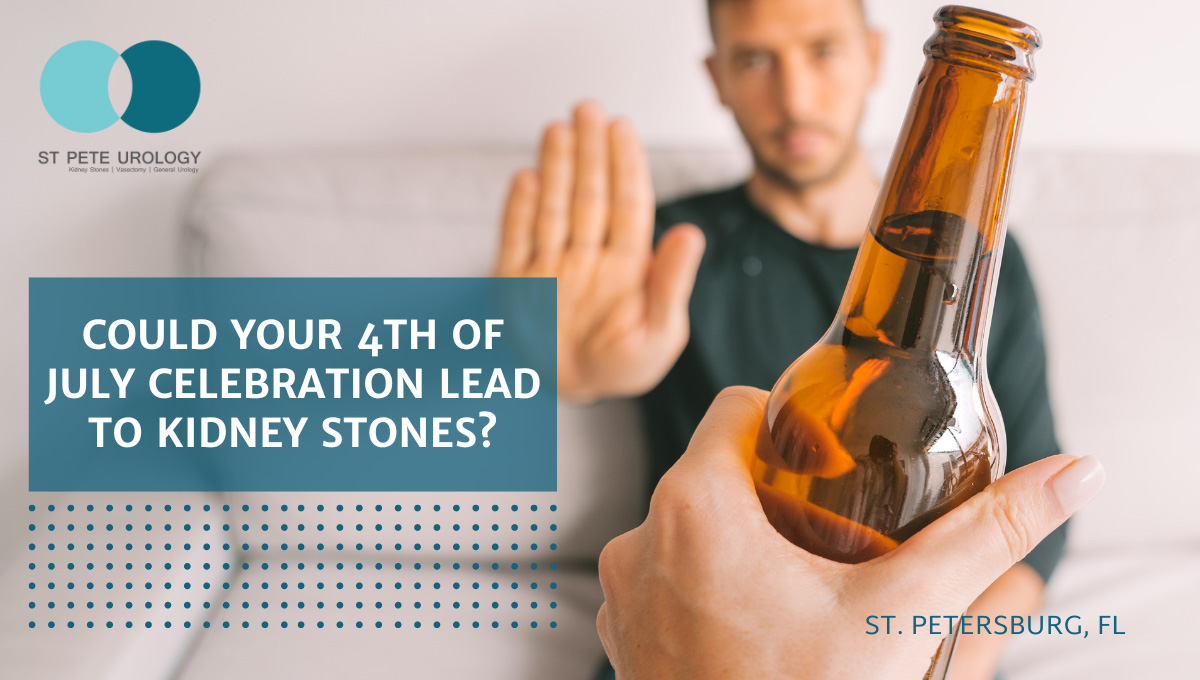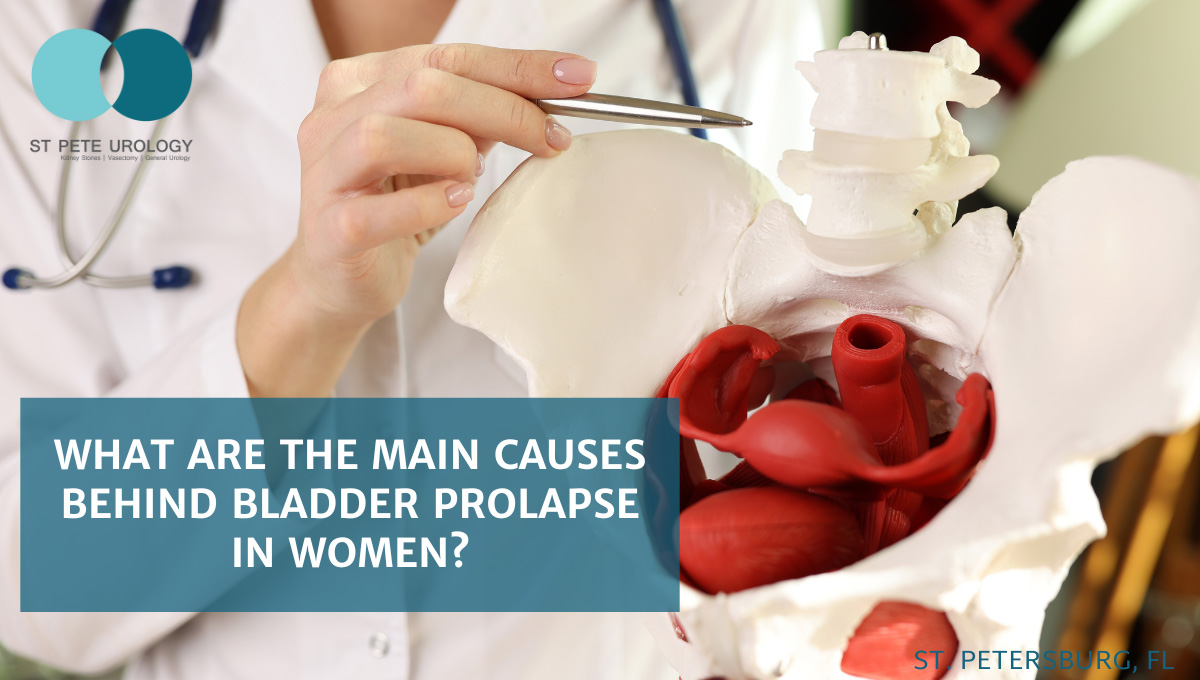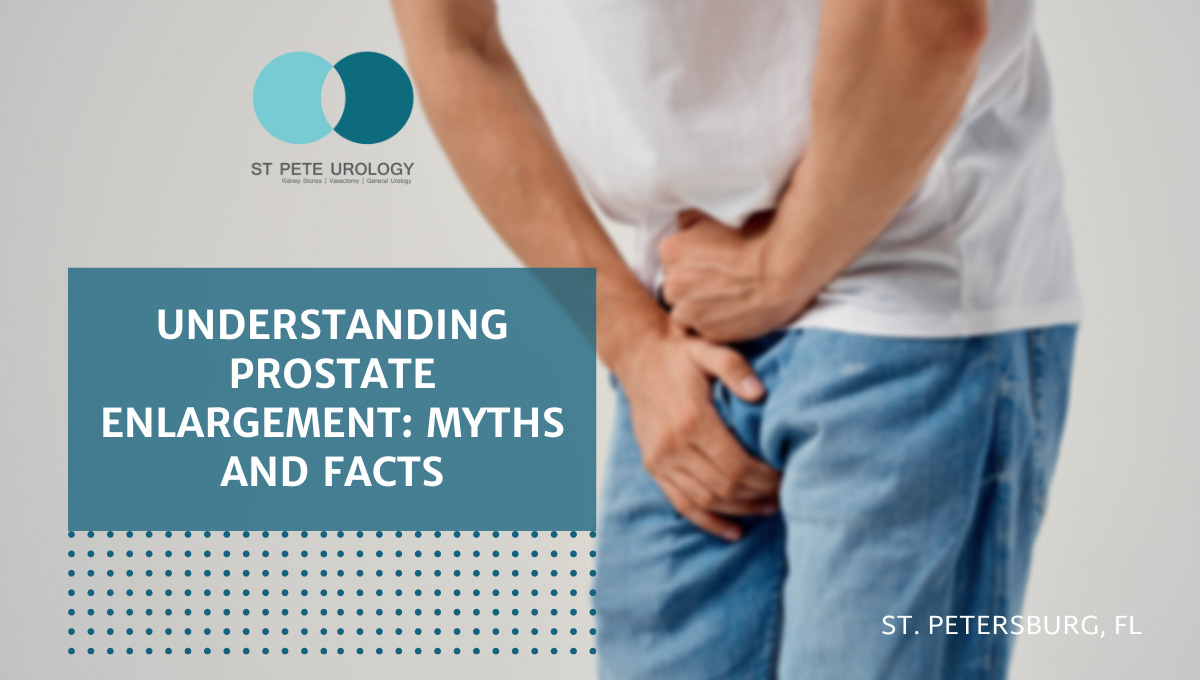What is BPH or Enlarged Prostate? BPH is a condition that will affect the prostate of nearly every man at some point after the age of 40.
Continue readingWhat Are the Main Causes Behind Bladder Prolapse in Women?
Bladder prolapse, also known as cystocele, is a health condition that could impact a woman’s quality of life significantly.
Continue readingWhat Are the Primary Factors Leading to Male Infertility?
Understanding the primary factors leading to male infertility is critical to helping you tackle the condition head-on.
Continue readingCan Prostatitis Be Prevented and How?
Understand how can prostatitis be prevented and why is it significantly more beneficial than managing and treatment of the condition.
Continue readingUnderstanding Prostate Enlargement: Myths and Facts
How much of what you hear about prostate enlargement is true? Learn about the myths and misconceptions about prostate enlargement or BPH.
Continue readingProstate Enlargement: What Every Man Should Know
By the time you reach the golden age of fifty and beyond, it’s not uncommon to experience symptoms of an enlarged prostate. Learn more here.
Continue readingDr. Nicholas Laryngakis Outlines Typical Indicators of Low Testosterone
Dr. Nicholas Laryngakis, urologist in St Petersburg, FL discusses the symptoms and indicators of low testosterone.
Continue readingCould Your 4th of July Celebration Lead to Kidney Stones?
Three Key Takeaways
- Consume foods that are lower in oxalates, such as lean proteins, fruits, and vegetables.
- Stay adequately hydrated during outdoor festivities to reduce the risk of kidney stone formation.
- Moderate alcohol intake to maintain a balance between celebrating and preserving kidney health.
 Each year, Americans mark the 4th of July with a grand display of patriotism involving parades, picnics, and fireworks. But amidst the fun and excitement, many are often oblivious to the potential health implications tied to this historical celebration. Among the bountiful food and beverages typical of any American festivity and the alcohol consumed in the spirit of celebration, a less conspicuous health risk emerges, kidney stones.
Each year, Americans mark the 4th of July with a grand display of patriotism involving parades, picnics, and fireworks. But amidst the fun and excitement, many are often oblivious to the potential health implications tied to this historical celebration. Among the bountiful food and beverages typical of any American festivity and the alcohol consumed in the spirit of celebration, a less conspicuous health risk emerges, kidney stones.
What are kidney stones?
Kidney stones are hard deposits made up of minerals and salts that form inside your kidneys. They are often caused by increased concentration of certain substances in the urine which crystallize over time, forming these hard deposits. Genetics, certain medical conditions, and certain diets are among the risk factors that contribute to the development of kidney stones.
Link between diet and kidney stones
Your food and beverage intake during the 4th of July can have profound implications for your kidney health. Who could resist those succulent BBQ ribs or the homemade spinach pie? But did you know that such foods are high in oxalates, an organic compound that can increase the risk of stone formation when consumed excessively? The celebrations filled with delectable treats and heaping plates of food often push us to consume more of these oxalate-rich foodstuffs, potentially laying the foundation for kidney stones.
Dehydration and kidney stone risk
The summer heat is another antagonist to your kidney health, especially during the 4th of July festivities. Dehydration, a likely occurrence during outdoor activities in the mid-summer heat, can lead to concentrated urine. This heightened concentration of minerals in the urine can increase the likelihood of kidney stone formation. Hence, it’s crucial to stay adequately hydrated during these outdoor festivities.
Alcohol consumption and kidney stone formation
Consider the role of alcohol in this scenario. Alcohol, if consumed excessively, can lead to dehydration, further compounding the risk of kidney stones. While it may be integral to the celebration for some, moderation in alcohol intake can help maintain a balance, preserving kidney health while still partaking in the festivities.
Prevention and tips for a kidney-friendly 4th of July celebration
So how can you enjoy your 4th of July celebration without risking your kidney health? Opt for foods that are lower in oxalates, such as lean proteins like chicken breast or fish. Consume plenty of fruits and vegetables, and significantly up your water intake. These are simple yet effective strategies for kidney stone prevention. And remember – moderation is key when it comes to alcohol consumption.
Wrapping up, it may seem far-fetched to connect a joyous 4th of July celebration with something as grim as kidney stones. But the link is not as tenuous as you may think. The food and drinks that we rejoice in, the summer heat, and the alcohol that often accompanies our celebrations, all play a role in potentially increasing the risk of kidney stones. But with mindful dietary choices and adequate hydration, you can enjoy a healthy and safe holiday celebration.
If you’re in St. Petersburg, FL, and are looking for professional advice or treatment for kidney stones, reach out to St Pete Urology. Their team of experienced urologists is at your service to help maintain your kidney health and prevent kidney stones. Let your 4th of July celebration be filled with joyous memories, not marred by avoidable health risks.
References:
- “Hydration for kidney health – Kidney Research UK.” https://www.kidneyresearchuk.org/kidney-health-information/living-with-kidney-disease/how-can-i-help-myself/hydration-for-kidney-health/.
- “Drinking Alcohol Affects Your Kidneys.” https://www.kidney.org/news/kidneyCare/winter10/AlcoholAffects.
- “Kidney Stone Diet Plan and Prevention | National Kidney Foundation.” https://www.kidney.org/atoz/content/diet.
Can you still have Orgasm after Vasectomy?
 Men, we all desire to be good husbands and partners. Many of you may have seen your wife or partner experience the adverse effects of some contraception. Some will want to help alleviate this unfortunate circumstance.
Men, we all desire to be good husbands and partners. Many of you may have seen your wife or partner experience the adverse effects of some contraception. Some will want to help alleviate this unfortunate circumstance.
The option of undergoing vasectomy may come up. This procedure is one big step to take a lead role in family planning and protect your partner. However, you may also have concerns about how it will affect your sex life afterward.
The good news is, vasectomy will not adversely affect your sex life.
It will neither reduce your sex drive nor affect your ability to have an erection. It will not affect your ability to ejaculate or have any difference in the amount of semen you ejaculate.
No effect on testosterone production
Your male characteristics depend on the hormone testosterone. Produced in your testicles and responsible for secondary sexual characteristics, testosterone is the hormone that maintains your libido (sex drive), sensation, and ability to have an erection and an orgasm.
An average testosterone level after vasectomy means you maintain the same level of sexual performance and satisfaction after the procedure.
So does a vasectomy affect your testosterone level? No. Your testicles continue to produce testosterone after the procedure, just as they did before the surgery. The operation is done on the vas deferens and not on your testicles, which means there are no effects on testosterone production. Plus, it means you continue to have normal erections, ejaculations, and orgasms.
If you experience a drop in testosterone after vasectomy, the reduction may be unrelated to the procedure. Such a reduction is often due to diminished function of the testes (hypogonadism), which is linked to age.
Hypogonadism affects 1 in 50 men aged 40-79 years. It is more common in men with diabetes, kidney disease, heart disease, or those taking certain medications, such as steroids. It may also be due to stress, depression, or too much alcohol.
If you notice any drop in your sex drive after vasectomy or feel you might have symptoms of low testosterone, speak with your doctor for help.
Normal ejaculations
A vasectomy does not significantly affect the quantity of the ejaculate. While the procedure ensures that the sperm made in the testicles do not pass through the vas deferens to reach the urethra, it doesn’t noticeably change the quantity of fluid you ejaculate.
In a typical ejaculation, the semen produced in your seminal vesicles and prostate gland forms 95-98 percent of the ejaculate. And so, since sperm only makes 2-5 percent of the ejaculate, preventing sperm from being included in the semen doesn’t make a big difference in the volume of the ejaculate. You will not even realize the difference in your ejaculations.
Remember that the procedure does not stop sperm production. Your testicles will continue to secrete sperm throughout your life; only that the sperm will not reach the urethra to be added to the semen before ejaculation.
During a vasectomy, your vas deferens is cut and blocked to stop sperm and make it impossible for them to travel to the urethra. The sperm dies and is absorbed by the lining (membrane) of the epididymis, where they dissolve naturally. The absorption process doesn’t interfere with testosterone production, erections, or orgasms.
Enhanced orgasms
With a vasectomy, you will feel relieved from the anxiety or stress of an unplanned pregnancy. And, with that freedom, your lovemaking will be more spontaneous, sensual, frequent, and intense.
Recent studies have shown that the procedure isn’t only reliable but boosts sex drive in men and ensures stronger erections and better orgasms without the risk of pregnancy.
Safe, effective vasectomy
Want to have a vasectomy but have questions before the procedure?
At St Pete Urology, we do vasectomies every week and guide men to make the right family planning decisions. We will listen to your concerns, give you the right advice, and help you make an informed decision.
Over the years, we have seen our clients undergo vasectomy procedures and report results that make us proud. We are happy that our patients retain the highest level of sex drive, firmer erections, unchanged ejaculation, and regular orgasms after the procedure.
If you’re considering having a vasectomy at St Pete Urology, you shouldn’t fear it would affect your sex drive or orgasms. We can guarantee that your sexual performance and satisfaction will only get better.
What is sex like with a penile prosthesis
 There is no such thing as “normal” when it comes to sex. What you like isn’t necessarily what another person likes. How important it is to you and how often you want it is also a personal preference, but what is common for everyone is the desire to have a pleasurable sexual encounter.
There is no such thing as “normal” when it comes to sex. What you like isn’t necessarily what another person likes. How important it is to you and how often you want it is also a personal preference, but what is common for everyone is the desire to have a pleasurable sexual encounter.
Men with erectile dysfunction who intend to have a penile implant inserted into their penis often want to know how it would impact their sexual pleasure.
Strong, reliable erection
A penile prosthesis enables you to have an erection that is strong enough for satisfactory sex. You will have an erection similar to a natural erection and will not have problems keeping it throughout sexual intercourse.
At St Pete Urology, we offer both inflatable and non-inflatable penile implants. An inflatable implant has two rods filled with fluid from a reservoir near the bladder. As the rods fill, the penis becomes erect. When there is no fluid in the rods, the penis is fully deflated and unnoticeable.
With the non-inflatable implant, a single rod is surgically implanted within the erection chamber of your penis. The rod keeps the penis in a semi-rigid state so that you merely need to lift it into position or adjust it by hand for sexual intercourse.
Regardless of whether the implant is inflatable or in a semi-rigid state, it will support your penis without making it larger or affecting the shape of its head. Expect your penis to be erect to about the same size as before you got the implant, and provide enough hardness for penetration and satisfying sex.
Unhindered sensitivity
A penile prosthesis does not affect the sensitivity of the penis, its glans, or its skin. You will not lose sensitivity and will generally respond to sexual stimulation. You will also have no limitations such as axial effort, traction, or your partner tightening the penis during sexual intercourse.
You can still enjoy different positions and enjoy normal orgasm and ejaculation—deriving maximum pleasure from your sexual encounters. The penis stays rigid even after orgasm, and it is up to you to choose to release the valve to remove the fluid from the rods and end the erection. You should also make sure to have good lubrication during intercourse.
Once you have a penile prosthesis, it may destroy your natural erection reflex. You should have the implant only when recommended by your urologist.
Hidden and unnoticeable
Due to the small incision made for the procedure, the healed scar after penile implant surgery is subtle and hidden to casual observers. The implant will be fully concealed and remain private. You can freely enjoy sex without worrying about your partner knowing you have an implant.
No one will be able to tell that you have a penile prosthesis until they see the small scar at the bottom of your penis. Even in the shower or locker room, it will remain undetectable.
Do you have erectile dysfunction? Would you like to restore your sexual function? At St Pete Urology, we understand that erectile dysfunction can severely impact your relationships and your quality of life. We offer various solutions that can help you with this predicament.
We typically recommend a penile prosthesis for patients who have not found the other ED treatments effective. After the implant surgery, patients can expect to enjoy healthy sex lives, enhanced self-esteem, and more satisfying relationships.
Schedule a consultation with one of our skilled and experienced surgeons at St Pete Urology to find out if a penile implant could be an excellent option for you









